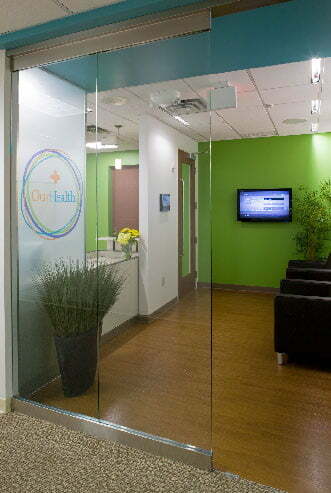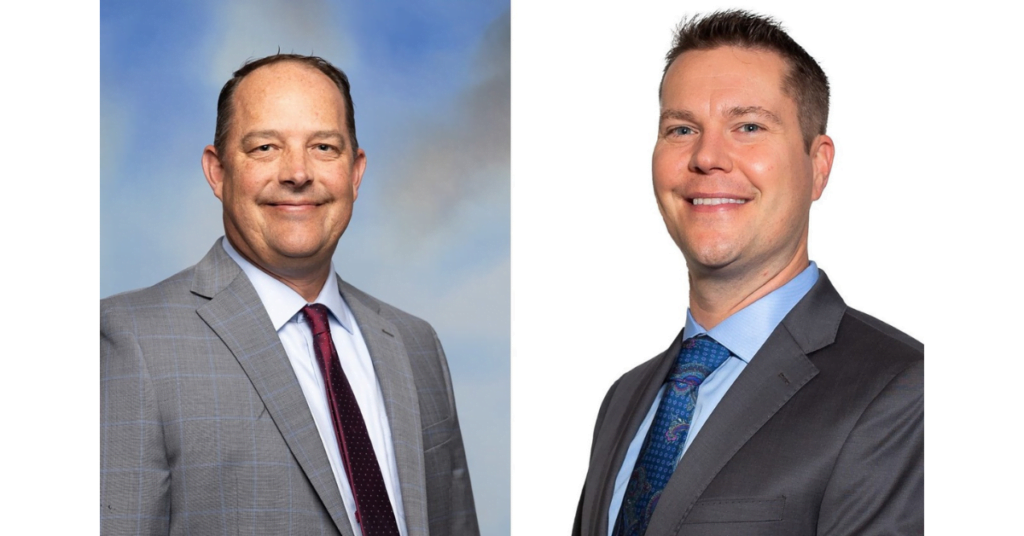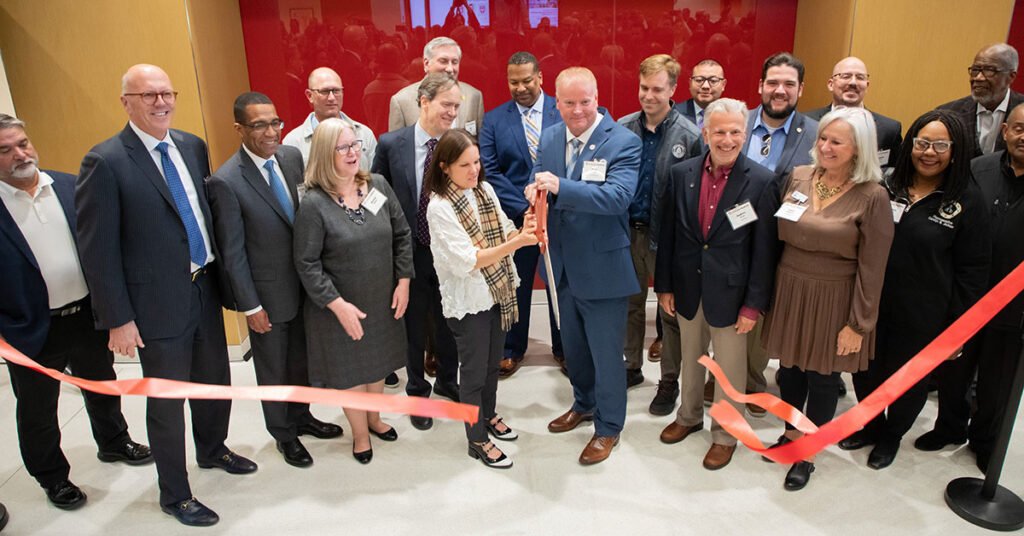Overall costs are down and convenience for employees is up.
by Rick A. Richards
So far, there isn't any data to support the idea that healthy workers are happy workers, but employers have discovered one thing about healthy workers–they're more productive.
And that has been enough to entice some Northwest Indiana business to embrace the idea of an in-house health clinic. It's a growing trend among employers as a way to keep health costs down and provide a way for workers to be more proactive in their own health decisions.
Aero Metals in LaPorte opened a health clinic 18 months ago, says Linda Stowell, vice president and chief financial officer. The clinic is across the street from the manufacturer, which makes it convenient for workers.
The clinic, known as WellPorte, is operated by Indiana University Health and also provides health services to employees for the city of LaPorte.
“We were looking at ways to reduce our health expenses,” says Stowell. “The idea of in-house clinics isn't new; we had considered it for four years.”
The key to making an in-house clinic work is to communicate fully with employees that the company isn't running the clinic and that the health information kept there won't be used by the company.

“Participation is voluntary and in fact we have employees sign a form acknowledging that it's Indiana University Health that's keeping the information, not us,” says Stowell.
By setting up a plan in which companies buy time from the health provider at a set rate, health costs can be reduced. At the same time, lab and prescription fees are either free or offered at greatly reduced cost to employees.
“With the system we have set up, an employee is more likely to go in and get the sniffles taken care of rather than waiting until it turns into bronchitis,” says Stowell. “Employees become more proactive.”
And instead of having to take a half a day or an entire day off to see a physician or visit the emergency room, workers can go to the clinic and be back in an hour.
“The clinic also helps us offer things like screenings for diabetes and high blood pressure here in the office. We do that with what we call a Lunch and Learn series where workers can take advantage of the sessions on their lunch hour,” says Stowell.
So far, about 70 percent of Aero Metal's 300 employees have taken advantage of the program, a figure that Nicole Fallowfield calls “phenomenal.”
Fallowfield is director of health risk management for Gibson, an insurance provider with offices in South Bend, Plymouth, Fort Wayne and Indianapolis.
“Provided things are set up the right way, it can really be a system that works proactively with employees,” says Fallowfield. Gibson helped Aero Metals set up its program with IU Health.
“What the program does is redirect health dollars a company was going to spend through a traditional plan to set up a clinic. That clinic charges a management fee to look after the health of each of the company's employees.”
Fallowfield says the concept is becoming more popular among employers. “They're seeing they can save a lot of money by going this route. What they really like is that they can develop a health calendar where professionals can come in and collect data on the needs of employees and then address those needs.”
Tammy McCune, a medical assistant with WellPorte, says that since the clinic opened in January 2011, it has become a popular health care option for employees. “The people who come in here love it,” says McCune, who staffs the office with nurse practitioner Joceyln Robbins.
“The screenings we do are popular, especially the ones on eating healthy, weight loss, depression and smoking cessation,” says McCune.
Teresa Ludlow, the clerk-treasurer for the city of LaPorte, says the city opted to go with WellPorte because it could no longer afford to cover the health needs of city workers through a traditional insurance program.
As city and state budgets got tighter, LaPorte had to cut back on the services it provided to residents and workers. Ludlow says the WellPorte proposal through IU Health had been a big benefit to many workers.
“We thought that maybe 20 or 30 percent participation would be good, but it's been much, much higher than that. It has been accepted much better than we thought it would be.”
Another company involved in setting up in-house clinics is OurHealth, based in Indianapolis. Company founder Ben Evans says OurHealth has established relationships with companies in Indiana, Illinois, Pennsylvania and Tennessee. Evans, an accountant, founded OurHealth with partner Jeff Wells, a physician, in 2009.
When Evans was working in the real estate business, many of his clients were involved in health care. That was when he recognized there were gaps in coverage around the state and it dawned on him there was an opportunity if he acted fast.
“We set out to build a model that was scalable for employers from 300 employees to 5,000 employees. There was a real need for employers to bring service onsite and to eliminate barriers that existed for workers to better manage their own health care,” says Evans.
OurHealth runs the clinics and hires the staff to provide the confidentiality that's vital for an in-house clinic to be successful. “We make sure the employees know there is no relationship to exchange information with the employer. That's important,” says Evans.
OurHealth has set up clinics with Centier Bank in Merrillville and with Culver Academy, but expects to announce additional relationships with three Northwest Indiana companies early in 2013.
“Every client we have has seen a reduction in health care costs during the first year of the clinic's operation,” says Evans. “Absolutely we think this is a model for business in the future.”
Chrisanne Christ, human resources director for Centier Bank in Merrillville, says the bank has been looking at the idea of an in-house clinic for seven years. Early in 2013, Centier will open its clinic in offices in its headquarters building.
“We hope it makes employees more proactive and will get them to take a closer look at their health,” says Christ. Already Centier has an in-house fitness center and for the past five years has operated a wellness program.
“For us, we think it's important to do what we can to take care of our associates,” says Christ. “With an in-house clinic, they don't have to take the day off work to see a doctor. They can stay right here.”
Christ says employees will be able to have lab and clinic work done for free and for Centier, the cost doesn't go onto the health plan.
“Our research shows it takes about three years for a clinic to operate in the black,” says Christ. “For us, we decided to include all our full-time and part-time employees in the plan, along with their family members. This just makes sense.”
Christ says Centier is emphasizing to its employees that any information collected through the clinic will not be passed on to the bank. “Privacy is important. The only way a clinic will work is if the people using it are sure their information won't be used by their employer.”
At Centier, all appointments are scheduled in 20-minute blocks, twice as long as appointments in physician offices. “Employees know that time is set aside for them and they will be able to spend some time talking with the physician on duty.
“We think that with the clinic our employees will be involved with health coaching efforts and will consider more wellness criteria in their lives,” says Christ. “We're always looking for what's next.”
As health care costs continue to climb, other organizations are considering in-house clinics. The South Bend Community School Corp. is looking at such a plan, which was presented recently by human resources director Curt Novotny.
“We started looking at this five years ago,” says Novotny. “We have space available in one of buildings and we think that with the mandates of Obamacare, it's going to be a plus for us. Obamacare will have 30 million people looking for their own physician and there just aren't that many out there to fill that demand. With our own clinic, we can provide care to our workers.”
The school board has delayed a vote on the clinic, with members saying they want to study the issue in more detail, but Novotny is convinced the board will approve it. He says that once they study the issue, they will concur with what the system's own committee concluded.
Bill Cummins, president and CEO of HealtheAccess Clinics, says his company's efforts to set up a network of in-house and private membership clinics around the state are paying off. The Valparaiso company has four clinics in Porter County, including at the Port of Indiana. Elsewhere, it has affiliated with the Indiana Manufacturers Association in Indianapolis.
Cummins, the former chief operating officer of Porter Regional Hospital, oversees the operation of the network of clinics for owner Don Kiger. He says the company is operated as a discounted rate program that allows patients to more efficiently spend their healthcare dollars and be more proactive. The clinics charge a minimal fee and anyone is eligible to sign up.
“Because people can pay a membership, it opens the doors of health care to them,” says Cummins.
Kiger says his MBA thesis was the blueprint for HealtheAccess. “The reason that HMOs failed was limited coverage. People go through life making bad health decisions and that leads to long-term problems, which are the most expensive to treat.”
By making HealtheAccess more readily available, Kiger says he hopes to make care more accessible. Early numbers from the clinics show that is, in fact, the case, with people making an average of 3.8 visits a year to the clinics compared to 3.5 annual visits to a traditional doctor's office.
“We think this develops a healthier workforce,” says Kiger. The goal is to help people become healthier by encouraging them to visit a doctor. Most people now only see a doctor when they're really sick, and that affects performance at work.
“Nobody likes going to the doctor, so we try to provide concierge service. We hold a room for you and try to make the process as convenient as possible,” says Cummins. “Our process is to review all of the lab and test results by the next day so you get the information as quickly as possible.”
“We believe we're the reformed face of health care,” says Kiger. “I believe we are the face of health care reform.”
Cummins says HealtheAccess has been fielding inquiries from schools, universities, municipalities and private business. “We think we're a part of the future.”




